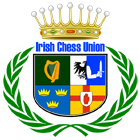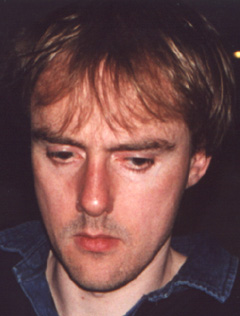In the Beginning
I started to play chess in my early teens. I can remember my weekly trips to the (now defunct) Refinery Chess Club run by the irrepressible Walter Fitzgibbon. At the time I felt it was taking me ages to improve, but looking back I realise that I improved quite quickly. At the age of 16 I won the Cork Junior Championship and the Cork Schoolboys Championship. The latter was a very tough tournament to win and the feeling I had when I finally defeated Christy Russell to take the title has never left me.
Chess as a Junior
Getting on the Glorney Cup team must be the dream of all Irish schoolboy players. I was obsessed with this goal. In 1982 I finished second in the Under-19 championships but in the machinations of the Junior selection committee, I was selected only as non-travelling substitute. When I heard this news I cried bitterly in frustration. Chess results had an acute effect on me in those days, something that I'm happy to say I learned to avoid in later years. As it happened, a player dropped out of the Glorney team that year so I did travel to Scotland and played on the bottom board. It was my first experience representing Ireland and needless to say it was a great thrill. My first opponent was a very young Dutch player named Jeroen Piket, who crushed me in a Trompovsky attack.
In 1983 I was chosen for the Glorney Cup team again, this time as top board. I was a bit on the wild side in those days; the summer of 1982 I spent working in Amsterdam and frequently slept rough in a public park there (that wasn't my intention, but someone stole my tent). In 1983 I played the Danish Masters in Holstebro and shared one of the lower prizes. After that tournament I spent several days hitchhiking to Carmarthen in Wales for the Glorney Cup. I remember being barefoot for most of that event, but I can't now remember why.
In 1984 I was chosen to represent Ireland in the World Junior Championships in Helsinki. This was a great honour and I prepared very carefully for the event. One of the things I did was to play through a Rook ending book by the Dutch IM Cor van Wijgerden. I find to this day that the work I did on chess that summer helps me. I finished on I believe 5.5/13, not a bad score in such a strong event. I won a nice game against Josef Klinger of Austria, now a strong GM and then already over 2450. Looking back on this game now it seems quite primitive, but I think it's quite typical of my style then. I also lost a simple R+P ending a pawn up against the Bulgarian Junior Champion through running out of time, which was exquisitely painful. Chess study doesn't protect you from this sort of thing.
College Years
I was very active in the UCC Chess Club while studying there from 82 to 86. One year I garnered a sizeable grant for the Mulcahy Memorial Tournament, I believe £1000, from the UCC Cork 800 fund. This led to a massive increase in the prize fund and several English professionals came to play in the event. This is commonplace nowadays, but then it was quite a treat. It always saddens me that the Mulcahy tournament has fallen by the wayside. I think if I were living in Cork I'd try to revive it. For many years it was the premier event on the Irish tournament circuit. I finally won it in 1991 after nearly a dozen attempts!
Living in the Netherlands
During my teens I developed something of a love affair with the Netherlands. I won't try to elaborate the reasons here, but after graduating with a degree in Computer Science from UCC in 1986, I took up a job with Philips and moved to Eindhoven in the south of Holland. This was of course a fine opportunity to improve my chess, but in fact I scarcely played at all there. I did join the local club and played some league games with them, but I didn't play a single tournament in my three years there. I think I was too taken up with other interests and somehow chess didn't seem relevant to me. I did take the opportunity to visit many of the superb tournaments in that area (Wijk aan Zee, Tilburg, Brussels) and got to see many of the great names for the first time.
Returning to Ireland
I returned to the 'old sod' in 1989 and my interest in chess was rekindled. I realised sometime in the early 1990s that I was within striking distance of the Irish Olympiad team. At this stage I was doing no work on my chess, but the possibility of representing Ireland at the highest level spurred me on to apply myself a bit more to the game. My rating picked up about 100 points in the following few years and in 1994 I was indeed selected to play in the Olympiad in Moscow. Playing an Olympiad is simply a marvellous experience. In the first round we were drawn against Latvia on board 10. This meant that we played on the stage with the other top teams and under the eye of TV cameras. I drew a stern, defensive game against Zhuraliov, which was a great start. I was on the road towards an IM norm at the halfway point of this tournament, but then lost three games in a row and destroyed my chances. Even so my final score of 5/11 was very respectable.
Memorable Events
The European Team Championships of 1997 was undoubtedly my best result so far. I was in fine form, winning some games as White in the English (e.g. against the Portugese master Frois) and defending doggedly with Black in the Caro-Kann and of course my pet Scandinavian. With two rounds to go I needed only 1 point for the IM norm against a rating average lower than mine. I lost the first game very unnecessarily but knuckled down well in the last round with White against Ipek of Turkey. Needing to win to make a norm is a tough task, but I kept my head and when we reached time control at move 40, it was clear to all that I had a winning position. My opponent lapsed into a 40-minute think, trying to find some way to hold his game together. I'm not sure what happened to me, but the heebie-jeebies got going in my head and I began to savour the taste of an IM norm. My opponent moved and uncorked a sparkling array of desperado tactics. It would normally have been little problem to me, but I failed to tune back into the game, missed the win and lost. All in all I was very happy with my result, 5/9 (the top Irish score), and feel that this sort of opportunity will come my way again.
I think every international event I have played in is a memorable one for me. I forget most of the Irish weekend events I play in, even the ones I've won! (The main exceptions would be the Dublin Festival 1995 where I beat IM Donaldson and Bunratty '97 where I tied for first place, drawing a nice game with Speelman en route.) However the intensity of an international tournament where most of your opponents (sometimes all) are stronger than you is a very special experience. I love the rhythm of these events: the morning preparing for the game mentally, physically and chessically, the afternoon fighting over the board, the evening then to relax, take some exercise, have a beer and sleep before the next day when it all starts again. This sort of event is a real holiday for me. It's exhausting of course, but I feel totally removed from my normal routine. On reflection, I've only had one really bad international tournament and that was a 9-round norm event in Newcastle a few years ago where I finished on 2/9 or something like that. I suppose if all my international events were like this one I'd feel differently about them!
Chess Style
I find chess style fascinating. In a way we all seem to be doing the same thing, sitting at the chessboard thinking, but in fact we all do such different things when we play chess. My main interest in chess is the challenge it presents to me to simply sit down and focus on one thing for several hours. When I am playing well, I'm extremely focused and my work rate is very high. It is this area of chess that interests me most. I'd rather learn to focus better than to improve some aspect of my play. Sometimes I see strong players after a game spending a long time to work out if some ending is winning for White or not. I find I'm generally just not all that interested in this sort of thing. I'll try to learn useful things that might help me in practical play, but I'm not too fascinated by chess positions otherwise. Composed problems and correspondence chess leave me cold.
Once at a GM tournament in Brussels I masqueraded as a chess journalist and got into the analysis room where Karpov was analysing his game with Seirawan. Seirawan had had a better ending and was trying to show that he missed a win. (At one stage he said, "Man, I got my Rook right up your kazoo", which I'm not sure Tolja understood!) After a while a whole host of grandmasters had gathered around the board and took Seirawan's side trying to beat Karpov. Whenever Seirawan would say something like "I must be winning here," all Karpov would respond with was "play your move". He was saying that he didn't know or particularly care if he was losing or not, but he would show Seirawan that he couldn't beat him. I've always been a great fan of Karpov's and this confirmed to me that in some way our view of chess is not dissimilar. Alas, this similarity doesn't venture further into chess strength!
In terms of pure chess style, I'm a positional player. I generally prefer defence to attack. I don't mind a bad position, that is to say, I'm happy to try to play a bad position as best I can and it doesn't depress me. I think this is a valuable skill to have in that many players tend to crumble when their position turns bad, but I can find the search for barely tenable lines (grovelling) fascinating. I think I can analyse tactics reasonably, but I'm often lazy in this regard and don't bother. I'm poor at managing my time and my thoughts are often a jumble of circular ramblings. I used be poor at assessing the dynamics of a position, but I've improved that side of my play. I can't recall the source, but I like the observation: "I know masters who are poor positional players, but I don't know any master who's bad at tactics."
The Future
It's October 1998 as I write and I don't feel that I'm finished yet! My results over the past year or two have been steadily good and my Irish rating is at its highest ever. This is in spite of the fact that I'm playing less chess of late than before. I believe that the IM title is within reach of any of the top Irish players, if they could see the weaknesses in their play and work to correct them. I'm still hopeful of getting there. Whether or not I do, I've had a fascinating time playing chess. I've been to places I would never have visited otherwise and made some very special friends through chess. I'm looking forward to a few more good games!

